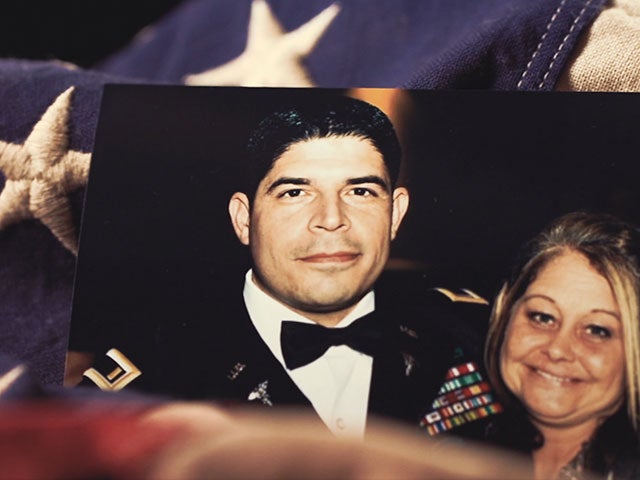Military Wife Hopes for the Impossible After Shooting
Angel remembers the day. “My friend calls me. She said, ‘Did you know there's a shooting?’ And I said, ‘Oh, my gosh! Don't tell me John was shot.’"
“Thirty minutes later his Captain shows up at the door. I went numb. And he's on the other side knocking and knocking. I'm shaking my head ‘no’ because I don't want to hear it. And he’s saying, ‘Open the door, open the door. He’s alive!’”
Angel’s husband, platoon leader John Arroyo, was rushed to Darnall Army Medical Center, where two surgeons immediately began operating to save his life. They soon discovered that a 45-caliber bullet had severed John’s jugular vein and lodged deep within the nerves of his right shoulder. One of the physicians was ENT doctor Alex McKinlay.
“Close proximity gunshot wound to the neck,” Dr. McKinlay shares, “with an expanding hematoma is a grave prognosis. We knew it was go time. We made an incision over the area to try to control the bleeding. Once we stopped that we exhaled a bit, but there was still bright red bleeding and so there was additional injuries. We looked and we knew that the bullet had gone through his, what's called ‘voice box’ the area where your Adam's essential is and your vocal cords, shattered his thyroid cartilage and we knew that there was probably some significant damage to that area of his neck.”
To help John breathe, doctors inserted a tracheostomy tube in his neck. Then, Angel was finally able to see him.
“They took me back there,” Angel describes, “and it was not my husband. His head was bigger than a basketball, his tongue was sticking out, it wouldn’t even go back in. And I just kept praying, you know, that everything would be okay.”
The following day, John was placed in a medically induced coma and transferred to Scott and White Memorial Hospital for additional care. There, doctors told Angel their prognosis for John.
Dr. McKinlay explains, “At that time we knew, A) he had lost a lot of blood; B) that his voice was probably going to be different because of the amount of injury that was sustained in the voice box and we didn't know if his voice would ever be normal again; and then C) his arm and the movement of his arm based on where that bullet went, we had no idea if that was going to come back either.”
Angel describes, “And they said, ‘He won't be able to talk because he's in a medical coma, so he's got to stay asleep until Saturday.’ And I went beside him and I grabbed his hand, and I was telling him I love him, and he woke up.”
“When I first see my wife,” John remembers, “I tried to sit up and I tried to talk to her. I just wanted her to know that I was going to be okay. I told her father, before he passed, that I would take care of her. That means everything. I couldn’t speak and I was writing on a whiteboard.”
“He's on medicine,” Angel shares, “so he wouldn't be spelling right. Like, ‘I love you’ would be, ‘I H, A’ just crazy. I didn't know I could love him as much as I do.”
“Two days after the surgery,” Dr. McKinlay explains, “He was doing his best to speak. He'd put his finger on his tracheostomy tube, and he had intelligible voice, which is very unusual in this kind of situation. We knew right away that he was a fighter, and we knew that faith was a big part of who he was and that he believed 100% that God was behind him and he was going to get through his injuries.”
As John slowly recovered his voice, he began sharing what happened that day.
Female Dispatcher: “Attention all units, we currently have an active shooter on Fort Hood…Just be advised, they are saying that the vehicle was a dark Toyota Camry.”
John says, “I've been in combat several times. Being a Green Beret you just know, you just know what shots fired sound like. And as I was looking where the shots were fired a vehicle pulls up. The next shot I heard, I was hit.”
John had just parked his car outside the First Medical Brigade when a 45-caliber slug ripped through his throat.
As John describes, “I see someone walking towards me in the distance. I’m trying to ask that individual for help within 10 feet, and I realize that it's the shooter.”
"’Jesus, help.’ That's the only thing I could try to muster was ‘Jesus help.’ probably the simplest prayer I've ever prayed but probably the most profound because he stopped, looked around and then walked into a building. I was just paralyzed. I couldn't believe it. I couldn’t believe that he didn't see me. It was God. God shielded me.”
Base Alarm: “Seek shelter immediately!”
Female Dispatcher: “The 3300 block of 72nd St. We have multiple gunshot victims. We also have some people escaping through windows.”
8 minutes after the first shot, three medics came running to the scene. Gripping his throat, John called out to warn them.
“I yelled back to them from across the parking lot, ‘I've been shot. There's a shooter.’"
Reporter Heather Sells: “Army Specialist Ivan Lopez opened fire killing three people and wounding sixteen others.”
Reporter Dale Hurd: “Confronted by military police in a parking lot, he then turned the gun on himself.”
Reporter Charlene Aaron: “They believe Specialist Ivan Lopez had an argument with a fellow soldier before the shooting.”
Reporter Efrem Graham: “The suspect had been evaluated for PTSD and was receiving treatment for depression and anxiety.”
In just a few weeks, John fully regained his voice and was eventually transferred to Brooke Army Medical Center, where he continues to receive therapy for his right arm. Last year, John was awarded the Soldier's Medal for "heroism above and beyond the call of duty” for warning others on the day of the shooting. And today, he serves as an aid to a two star general at Fort Sam Houston.
Dr. McKinlay shares that, “When everything was said and done, and I look at the sequence of events between where John was shot, the timing of how quickly he was taken from the location to the hospital, and then being rushed right to the operating room with two surgeons who are ready to go, being able to stop that bleeding – all that in such a short period of time, I think it's nothing short of a miracle.”
“I don't believe in luck,” Angel says. “It's Christ. That's it. It's God, and I can't explain it any better than that.”
“They said,” John explains, “I would have a trach in my neck for a minimum of six months; it was out in two months. They said, ‘We don’t know if you'll ever talk again.’ I'm talking to you right now. They said, ‘We don't know what's going on with your arm.’ My arm moves today. There's no limits when it comes to God.”




